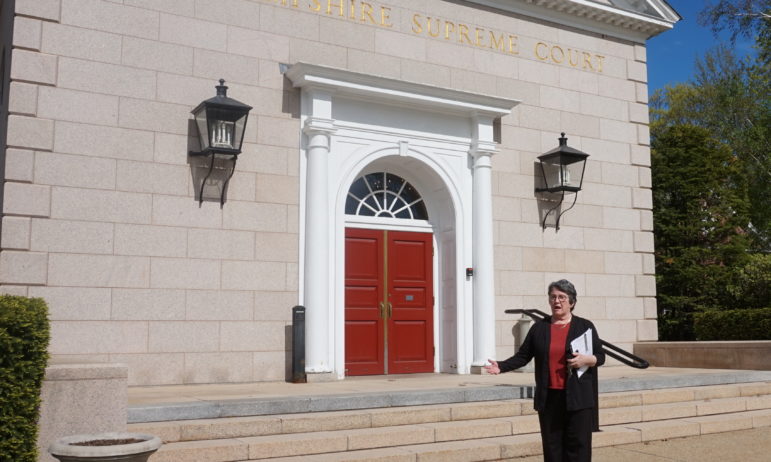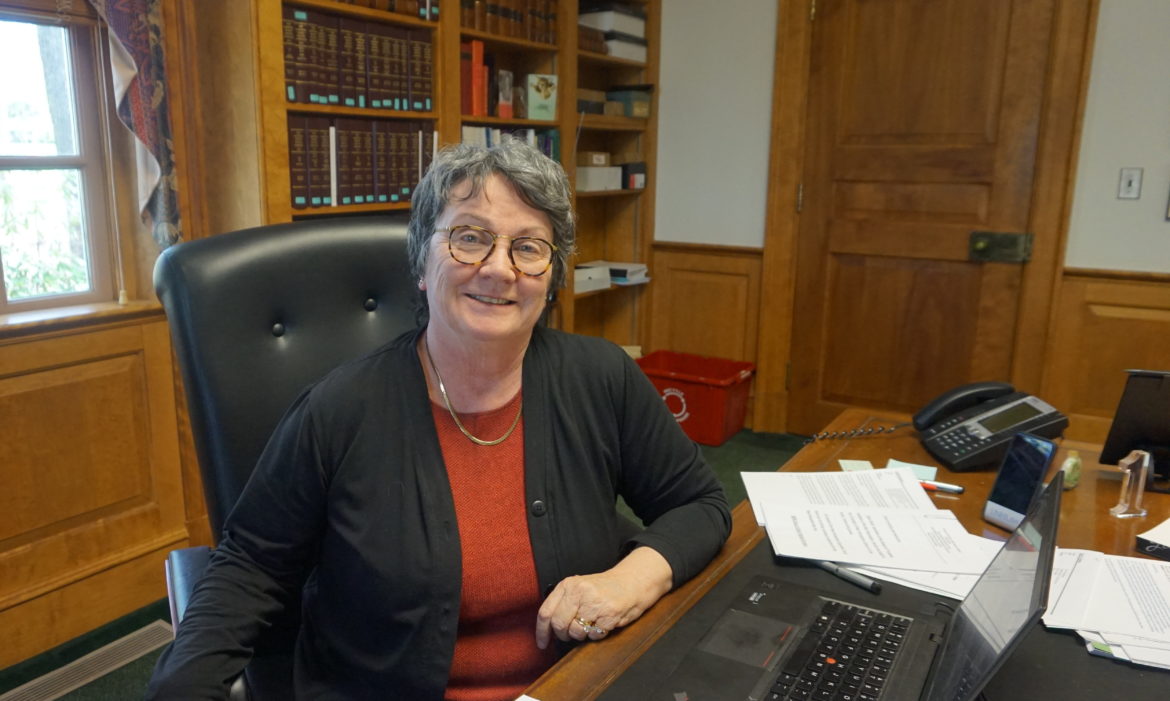
Nancy West photo
Chief Justice Linda Stewart Dalianis is pictured in front of the state Supreme Court in Concord.
Supreme Court Chief Justice Linda Stewart Dalianis is a woman of many firsts, but colleagues say it is her talent, tenacity and temperament – certainly not her gender – that have propelled her to the top of the state’s judiciary.
Soon to celebrate her 36th year on the bench, Dalianis was the first woman appointed to the state Superior Court, then its first woman chief justice. She was the first woman appointed to the state Supreme Court, and then the first woman to serve as its chief justice.
Not bad for the 1974 Suffolk University Law School graduate who was only the 50th woman ever admitted to the practice of law in New Hampshire.
“I’ve been around long enough to have been a part of, or an observer of, the myriad incremental changes in the courts,” Dalianis said during an interview at the Supreme Court in Concord.
Each of the changes had one main goal. “The initiatives were meant to improve the way the administration of justice takes place in New Hampshire,” Dalianis said.
Dalianis agreed to discuss with InDepthNH.org the many changes she has witnessed, or overseen and implemented in the court system – from the 1984 unification that placed local and county courts under the state control — to the recent creation of the Circuit Court system and New Hampshire’s E-Court project.
Circuit Courts
The Circuit Court system is now the aggregation of what used to be the district, probate and family courts.
“That’s pretty much 80 percent of all the business in the branch (Circuit Courts) so the Superior Court now makes up about 20 percent,” Dalianis said.
Marital masters are being phased out, she said, largely because of complaints from the public who saw them as less than judges even though Dalianis believes they had the most expertise. As they retire, marital masters are not being replaced. A number of marital masters have been appointed to the Circuit Court system.
“Eventually there will be no more marital masters,” said Dalianis, who started her career on the bench as a marital master. “There has been so much criticism of marital masters as not being real judges over the years.”
E-Court
Probably the most important ongoing work is New Hampshire’s E-Court project, the digitizing and connecting of all of the work for the entire branch, Dalianis said.
It’s a huge undertaking in the $76 million branch of government. It will make the court system seem like a whole new world in five years. “There won’t be any paper,” Dalianis said.
In 2012, the court rolled out the judicial information center that is saving time and money, she said.
“This is huge and invisible to the outside world,” she said. Specially trained operators at a call center answer questions from the public. They handle 70 percent of all of the calls, freeing up staff time to expedite court orders.
“Last month they received their two-millionth phone call,” Dalianis said.
Secrecy
A Supreme Court rule that said materials that are sealed in the trial court would remain sealed on appeal annoyed Dalianis.
“So we changed the rule,” Dalianis said. “As of Jan. 1, the rule is that we can take an independent look at whether materials that were sealed in the trial court should remain sealed here, at least as far as cases that are appealed are concerned.”
That gives the Supreme Court more control over whether there should be public access to materials. It was an important change to Dalianis.
“Because it’s the public’s business,” Dalianis said. “It’s not private. To me, it goes without saying.”
Tumultuous time
Retired Supreme Court Justice Joseph Nadeau spent much of his career working with Dalianis when they both served on the Superior Court, then on the Supreme Court.
The job of chief justice has changed a lot, Nadeau said, with so many more demands on the chief justice’s time. Far more time is devoted now to the administration of the courts along with hearing appeals, he said.
“She is a good person for that,” Nadeau said. “She is a respected trial judge; she’s fair and has the temperament you want to see in a judge.”
Dalianis was appointed to the Supreme Court in 2000 by then governor, now U.S. Sen. Jeanne Shaheen, D-NH, at a difficult time. It was during the impeachment of then-chief Justice David Brock, who was later acquitted by the Senate, and forced resignation of then-Justice Stephen Thayer.
Dalianis and Nadeau were both new to the job at the time. Besides handling the work of the court, Nadeau said they were also responsible for pulling together documents for the House of Representatives’ investigation. They often heard appeals sitting with three Superior Court judges because of the probe, he said.
Colleagues’ praise
It’s hard to separate Dalianis as a judge from how she is perceived as role model to women, colleagues say. Former Supreme Court Chief Justice John Broderick said he remembered cases early in his career in which they were on opposing sides in a case.
It was truly unusual to see a woman trial lawyer in those days, Broderick said. “It’s amazing what she has done in her career. She’s truly amazing,” Broderick said.
Sen. Shaheen, who was New Hampshire’s first woman governor, praised Dalianis as an incredible trailblazer for women.
“She continues to be a role model and inspiration to so many who aspire to careers in public service within our legal system,” Shaheen said.
Changing times
Gov. Maggie Hassan said one of her lasting impressions of Dalianis is when the chief justice swore her in as governor.
“In a ceremony presided over by a female Speaker of the House, the female Chief Justice of the New Hampshire Supreme Court swore in a female governor, at the same time we had the first all-woman congressional delegation in the country,” Hassan said.
Dalianis sets a fine example, Hassan said. “She sets an example for all aspiring women leaders that even with all the demands placed on women – whether studying, in the workforce, taking care of a family – you can more often than not find a way to make it work.”
In a 2011 speech to the Bar Association, Dalianis remembered some of those demands. Now, she is coming up on her 45th wedding anniversary with husband, Griffin, and they have two grown sons.
“When I went on the bench, I was seven?months pregnant, I had a four?year?old at home, and I was the only woman on the court,” Dalianis said in her speech.
“At that point, I was not focused upon anything going on in the court system. I was just trying to be a good judge, and I was only vaguely aware that the administration of the courts had recently experienced great change.”
Sexual harassment
The court system has a strong anti-sexual harassment policy, Dalianis said. Personally, she doesn’t remember being harassed.
“Judges carry with them a kind of an aura of ‘don’t mess with me,’” Dalianis said.
There was a period of adjustment, however, for some bailiffs when she first presided over trials over what to call her.
“Back in the day, there were bailiffs who would refer to me as ‘dear’ and ‘honey’ reflexively.
“And I would say: ‘That’s Judge Honey.’ Eventually they figured it out.”






